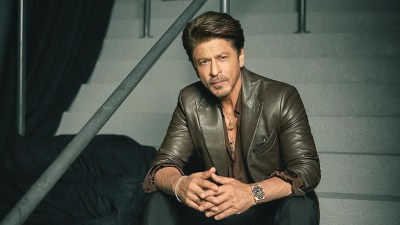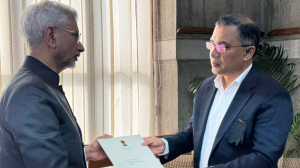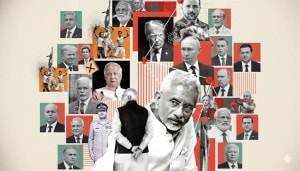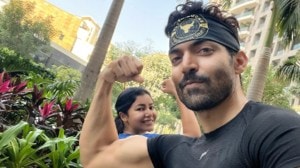Weak PM in waiting?
It8217;s a 25 crore rupee question thank you, A.B. Bardhan as this goes to print, whether Manmohan Singh or L.K. Advani...

It8217;s a 25 crore rupee question thank you, A.B. Bardhan as this goes to print, whether Manmohan Singh or L.K. Advani will claim victory after the July 22 trust vote. But whatever happens it would be hard to call Singh a weak prime minister again. And whatever happens, it would be a good point to start asking whether Advani is a weak party leader.
Singh finally managed to force the UPA to take a call on the price to be paid for a certain kind of political support, a leadership gambit that will survive a trust vote loss because it rests on a fundamental appraisal of politics and policy. Advani, even if the government loses the trust vote, will have failed this leadership test.
All through the UPA8217;s term, Advani has routinely called Singh 8220;weak8221; and routinely his critique has found some resonance with political reality. Singh has not been a prime minister with enough control of his policy agenda for most of his term. Whatever his problems, howsoever full of ideas he was, that was the reality. And prime ministers should not be judged with too much sympathy. It8217;s bad for democratic accountability.
In contrast, few people, including Singh, have called Advani weak. But the BJP leader has been weak, too. Before explaining why Advani8217;s favourite adjective for Singh applies to the BJP leader as well, let8217;s try and understand the discrepancy 8212; why did Advani8217;s weakness as a party leader remain below the radar while Singh8217;s as a government leader registered so strongly.
Government leaders deservedly get more scrutiny than opposition leaders. So Singh8217;s leadership abilities attracted more attention than Advani8217;s. But there8217;s a more interesting reason. Advani8217;s advantage vis- agrave;-vis Singh in this kind of comparison is that the former is a political leader in the most fundamental sense of the term, the latter is not. An MP many times, in politics for decades, once a practitioner of mass mobilisation politics and a party member who came up through the ranks, Advani is a political veteran. Singh is a novice by comparison 8212; a bureaucrat for most of his professional life, a technocrat finance minister who decided to stay in politics and a prime minister selected under extraordinary circumstances. That Singh, if he were to win the trust vote, would complete his term as prime minister as a Rajya Sabha member from Assam, therefore without getting elected by voters directly, is a good indicator of where he stands vis- agrave;-vis Advani in terms of political pedigree.
Singh8217;s lack of political pedigree and Advani possessing bagfuls of it always influenced our assessment of their leadership abilities and indeed perhaps their mutual assessment of each other. This is not unfair. It is understandable and those who take politics seriously will appreciate why this works to Advani8217;s advantage.
But a fact that8217;s masked is still a fact. And the fact is Advani produced leadership failures quite similar to those of Singh8217;s. Various factions, ideologues, leaders claiming closeness to the Family have in various ways scuttled his plans for change 8212; this sentence applies to Advani as much as to Singh, once you account for the fact that 8220;Family8221; and 8220;Parivar8221; mean different things in the BJP and the Congress.
Advani8217;s admirable Jinnah gambit ended in a whimper. His apparent willingness to parse, if not change, the BJP8217;s line on the nuclear deal was abandoned quickly. Advani8217;s supporters will be quicker to say this is a gross misreading of the party situation. However, the two worst-kept secrets in the BJP are, first, that under slightly different conditions the party would have happily supported the nuclear deal and, second, Advani would have been happy had those slightly different conditions appeared but seems incapable of engendering them.
Now, Advani may have faced formidable difficulties at different points of time over different issues 8212; the Rajnath Singh factor, the RSS factor, the Yashwant Sinha-Arun Shourie factor, the 8220;how does what Brajesh Mishra say matters8221; factor, etc. However, similar arguments, different in details, applied to Singh as well. And just as prime ministers don8217;t deserve too much sympathy, neither should leaders of the opposition.
True, it can be argued that Singh8217;s opportunity cost for forcing a change now is lower than Advani8217;s. Near the end of his term, with no guarantee that even in a victorious Congress he will be re-elected or perhaps we should say re-selected as prime minister, and knowing that allies8217; willingness to face elections increases as the government8217;s term approaches the end, Singh has a better incentive structure than Advani. The latter is his party8217;s prime ministerial candidate, the BJP, on the back of recent electoral success and, given general elections8217; anti-incumbency bias, is full of hope. So Advani risks much more in trying to shift paradigms in such situations.
But Advani couldn8217;t shift paradigms even when the BJP was in post-2004 electoral shock, when talk of electoral success was a bad joke and when, given the despair in the BJP then, the opportunity cost of forcing a change would have been lower because, frankly, losing a few 8220;principles8221; when you don8217;t have much to lose is easier; just ask some of the politicians who are now supporting the nuclear deal.
So whichever way you look at it, on at least two occasions Advani has not carried himself and his party forward on his better instincts 8212; that8217;s a polite way of saying he8217;s been a weak leader.
As a result, the BJP looks horribly confused. The Congress looks limp. But looking confused is an especially bad advertisement for a cadre-based, right-of-centre party.
Of course, the next elections may get the BJP back in power despite this; far stranger things have happened in Indian politics. But if, as a government leader, Advani8217;s leadership doesn8217;t change substantively, there will be very important consequences.
No national politician has any time for anything but political arithmetic till July 22. But after the trust vote, L.K. Advani may want to start thinking whether, if and when he finally becomes prime minister, he would want a political novice like Manmohan Singh to call him weak.
saubhik.chakrabartiexpressindia.com
- 01
- 02
- 03
- 04
- 05































